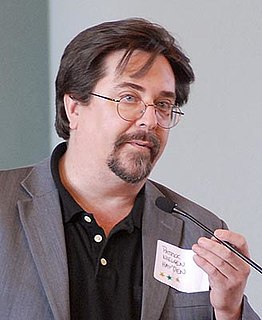A Quote by Victor LaValle
In the past, a writer had to go outside and get to know others before learning about their work, but the Internet has made humanity more accessible for misanthropes like me. I read blogs, tweets, Facebook posts and Reddit threads where people detail their jobs.
Related Quotes
Like most authors, I'm a raging egomaniac. I know that about myself. And I know that, if I had internet access, I would waste countless hours looking up things about myself, writing fake posts about how great I am and arguing with people who don't like my work. It saves me a lot of time and frustration to just stay out of the loop.
I think it's important to humanize history; fiction can help us remember. A lot of books I've read in the past have been so much more important than textbooks - there is an emotional connection with one particular person. I'm very much of a research-is-important type of fiction writer, even for contemporary fiction. I wrote about blogs in America and I've never blogged. But I read many, many blogs - usually about feminist things, or about race, or about hair.
Most kids come home from school. They don't go to their TVs first. They go to the Internet. They check their emails, or some blogs, or some sites. Then they go watch TV. Other people are at work all day 9-5 in front of a computer. They see certain clips. We're not going to hide the fact that people use the Internet. We're going to try to be as interactive as possible with our fans. I'm currently on Twitter and Facebook and Flicker and Dig. I'm on all that stuff.
One of my relatives had been asking me on how he could break into AI. For him to learn AI - deep-learning, technically - a lot of facts exist on the Internet, but it is difficult for someone to go and read the right combination of research papers and find blog posts and YouTube videos and figure out themselves on how to learn deep-learning.
The emails and the tweets and the Facebook posts and the fan mail that we get from young people all over America that are on the football team or on the hockey team are so touching. They tell me, 'Hey, this is me. I still have to remain in the closet, but your role in '90210' makes me feel better the way being gay is being portrayed.'


































